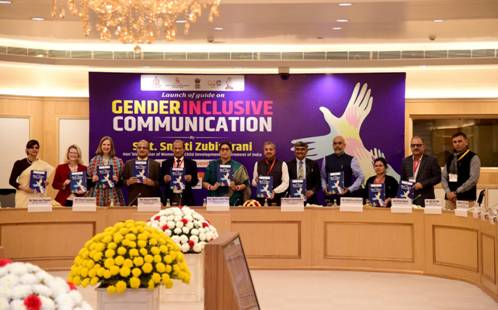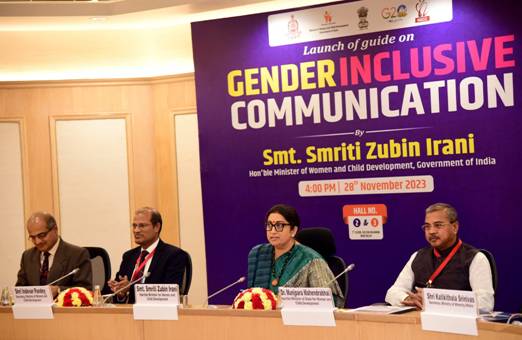Ministry of Women and Child Development
Union WCD Minister, Smt. Smriti Zubin Irani launches ‘Guide on Gender-Inclusive Communication’ at a National event held in New Delhi
Exhorts for adopting gender-inclusive language that can challenge stereotypes and promote a more respectful and equitable environment for all,
Prime Minister Shri Narendra Modi’s clarion call of women-led development has become a national priority for the country: Smt Smriti Zubin Irani
The Guide provides recommendations and examples on use of Gender-Inclusive language that avoids bias towards a particular sex or social gender
It heightens awareness, empower individuals to navigate daily communications with a commitment to gender neutrality and inclusivity
प्रविष्टि तिथि:
29 NOV 2023 11:27AM by PIB Delhi
Smt. Smriti Zubin Irani, Minister of Women and Child Development (MWCD) launched a ‘Guide on Gender-Inclusive Communication’ in Vigyan Bhawan, New Delhi on 28th November 2023. The guide, titled “Gender-Inclusive Communication”, was prepared by the Lal Bahadur Shastri National Academy of Administration (LBSNAA) in collaboration with UN WOMEN and Bill & Melinda Gates Foundation. A result of extensive consultation with stakeholders, the Guide provides recommendations and examples on use of Gender-Inclusive language that avoids bias towards a particular sex or social gender and is less likely to convey or amplify gender stereotypes.
The guide covers the use of language in English, Hindi, and other Regional languages, based on the “Handbook on Combatting Gender Stereotypes” by Supreme Court of India and other national and global best practices customized to suit the requirements of the Indian citizens. The guide also includes a checklist for gender-related revisions and key resources for further reference. The guide is intended to assist in gender-inclusive writing, review, and translation of documents and communications by government officials, civil servants, media professionals, educators, and other stakeholders. It aims to: heighten awareness, empower individuals to navigate daily communications with a commitment to gender neutrality and inclusivity, and fundamentally reshape the narrative towards a society where language becomes an agent for positive change. By highlighting and acknowledging implicit biases present in everyday language, the guide can serve as a catalyst for change.

The Chief Guest at the launch event was Smt. Smriti Zubin Irani, Minister of Women and Child Development. The event was graced by Dr. Mahendrabhai Munjpara, Minister of State for Women and Child Development, Shri Indevar Pandey, Secretary, Ministry of Women and Child Development, Shri K. Srinivas, Secretary, Ministry of Minority Affairs, Shri Sriram Taranikanti, Director, LBSNAA and Chairperson, National Gender and Child Centre, Ms. Susan Ferguson, Country Representative, UN Women, Sh. Hari Menon, Country Director, Bill & Melinda Gates Foundation and Ms. Disha Pannu, Deputy Director and Executive Director, National Gender and Child Centre, LBSNAA. Also in attendance were senior officials from various government ministries and departments, experts from UN agencies, representatives from the National Commission for Women, National Commission for Protection of Child Rights and other senior dignitaries and experts.
Dr. Munjapara Mahendrabhai, Minister of State, WCD explained how this guide is a significant milestone in the journey of creating a society where women not only become equal partners but there is paradigm shift where women are the leaders. Secretary, WCD, Shri Indevar Pandey elaborated on key efforts being undertaken by the Government for women empowerment. He highlighted how this guide on Gender Inclusive communication can act as an asset in the country’s endeavours towards women-led development.
Shri K. Srinivas, Secretary Ministry of Minority Affairs recalled that it was during his tenure as Director, LBSNAA that the idea for making such a ‘guide’ was incepted under the guidance of the Minister Smt. Smriti Zubin Irani, and that it was his privilege to have started this seminal work. He added that the release of this ‘lexicon’ was epochal since it is perhaps the first such exercise to be done anywhere in the world. Shri Sriram Taranikanti, Director, LBSNAA and Chairperson, National Gender and Child Centre went on to shed light on the importance of this guide and stated that “For the first time in history, we are talking about a proper language of communication that talks about all genders in equal forms. Language, when it communicates, also sets parameters and sets relationships."
Mr. Hari Menon, Director, BMGF in his address on the occasion, highlighted how over the last few years, particularly in the last 12 months during the Presidency of G20, India has given shape to the vision laid out by the Prime Minister of India and by doing so India has helped elevate the conversation of women led development to the Global level.

In her keynote address during the event, Smt. Smriti Zubin Irani, Minister of Women and Child Development, spoke about the need for promoting gender-inclusive language. She said that Prime Minister Shri Narendra Modi’s clarion call of women-led development has become a national priority for the country and we are making great strides in empowering women and creating an ecosystem that is safe, equitable and just for all irrespective of gender. The use of appropriate language is a key element of this journey. Prime Minister Modi ji’s use of ‘Divyang’ for specially abled people has helped combat stereotypes against the community and is a great example to follow. She also said that the day was of great significance as in the forenoon, the Ministry had released “Aanganwadi protocol for Divyang Children'' and in the afternoon, a guide on “Gender Inclusive – Communication”. Smt. Irani highlighted how the language of power today has been embellished by empathy and equity because of this guide. The Union Minister desired that the copies of this lexicon will be made available in regional languages across the country soon to bring forth a positive change . The Minister exhorted that by adopting gender-inclusive language, we can challenge stereotypes and promote a more respectful and equitable environment for all.
Speaking on the occasion, the dignitaries highlighted that the language is not just a means of expression; it is a reflection of our values and principles. The dignitaries said that the guidelines will play a pivotal role in empowering our civil servants to communicate not only efficiently but also with a heightened sensitivity to the diverse perspectives and identities that exist within our society. By fostering a culture of respect and understanding, we aim to create an administrative environment that is not only effective in its functioning but also resonates with inclusivity and empathy. These guidelines provide a roadmap for our civil servants, in particular and the common citizens in general, for ensuring that their communication should be a catalyst for positive societal change that is equitable for all”.
*****
SS/AKS
(रिलीज़ आईडी: 1980639)
आगंतुक पटल : 2352